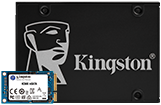Ask an Expert
Planning the right solution requires an understanding of your project’s security goals. Let Kingston’s experts guide you.
We notice you are currently visiting the UK site. Would you like to visit our main site instead?
Your web browser is out of date. Update your browser now for better experience on this site. https://browser-update.org/update-browser.html


Prof. Sally Eaves is Chair of Cyber Trust and Senior Policy Advisor for the Global Foundation of Cyber Studies and Research. Described as the “torchbearer for ethical tech” she is the inaugural recipient of the Frontier Technology and Social Impact Award, presented at the United Nations. A Chief Technology Officer by background, and now Professor in Advanced Technologies and a Global Strategic Advisor across Emergent Technologies, Sally is an award-winning International Author, MC, Keynote Speaker, and Thought Leader on Digital Transformation (AI, 5G, Cloud, Blockchain, Cybersecurity, Governance, IoT, Data Science) alongside Culture, Skills, DEI, Sustainability and Social Impact.
Sally educates and mentors actively to support the next generation of tech talent and has founded Aspirational Futures to enhance inclusion, diversity and equality in education and technology, with her latest book on “Tech For Good” set to be released soon. Sally is consistently recognised for global influence in the technology space by leading bodies such as Onalytica, appearing in the top 10 worldwide across multiple disciplines from AI to 5G to Sustainability and beyond.
Cybersecurity should be high on the agenda for all businesses in 2022. In some small and medium enterprises (SMEs), security can be seen as an afterthought or may not have the resources or skillset in house. It's important to protect your business now and in the future. In the last article How to close the security gap for small and medium size enterprises, we talked about the challenges that SMEs face, here prof Sally Eaves shares her top 12 cybersecurity tips to help them and their employees:
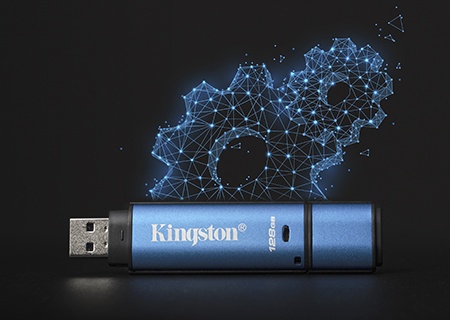
Software providers release updates for a myriad of reasons including enhanced functionality, bug fixes and security patches. Ensure your software is continually updated to the latest version as and when it becomes available.
With over 1,000 different laws impacting cybersecurity, privacy, and governance globally today – and growing - this can create a complexity challenge. Deploy automation wherever possible to better visualise, manage, measure and ultimately solidify your compliance end to end.
There is no need to always follow the latest leading edge technology innovation, but you must at least keep up to date with your software upgrades. With software developers realising the risk of software vulnerabilities, they offer a periodic update. However, these new updates might not be compatible with the hardware of the device. This is what leads to outdated hardware, whereby the hardware isn’t advanced enough to run the latest software versions – avoid creating this risk.
Keeping data safe is critical especially the data that exists locally with your employees. Encrypted USBs can be very effective here, helping ensure that sensitive data can be stored and transferred as securely as possible. Secure data backups are essential for any small and medium enterprise. Remember, malicious threats and hackers don’t always want to steal your data, but sometimes use ransomware where the end-goal is to encrypt or erase it. Data recovery resilience is key.
Utilising a VPN for your internet access protects your private information, even from your ISP. Software VPNs are now widely used today and with very good reason.
With so many applications utilising this connectivity protocol, Bluetooth devices can and do get hacked regularly, and are often linked to phishing messages enticing you to “click here” – don’t do it!
Malicious links can do damage in several ways. It is important to train your employees on how to identify such links. Be sure to inspect links and ensure they are from known trusted senders before clicking.
It’s not just your office (or home) desktop that needs to be secured. It’s important to get into the habit of securing your mobile device as well. Use strong 2 Factor Authentication passwords and biometric features.
When hackers cannot find a security vulnerability, they’ll attack in other ways. Enter Social Engineering. This type of attack focuses on the mindset and concerns of the user, rather than on the device, to gain access to systems and information. Delete any request for personal information or passwords. Nobody should be contacting you for your personal information. Always be mindful of risks.
It’s “not an if but when” scenario and with the ever-expanding cybersecurity threat landscape it can be difficult to always stay ahead of malicious attacks that are evolving in sophistication too. Have a plan that deals with “after the fact” breaches and practice/test your response regularly.
The people factor is one of the biggest risks in cybersecurity and with social engineering, phishing, and ransomware attacks now a day-to-day occurrence, educate yourself, your family, and your team on the topic of cybersecurity regularly - and stay diligent too! And from SME right through to Enterprise there are fantastic and often free resources available to help you do just that.
We need technology, governance, compliance, legislation, education, and insurance to come together to negate security risks. Explore opportunities to share your knowledge, best practice suggestions and “get involved”. Everyone benefits from such a co-creative and open approach to security sharing.
Data breaches, hacking and the human element are continuous reminders of threats and risks worldwide. The costs associated with a data breach and the unfortunate exposures can be significant. It’s important to implement the top tips to help secure your business now and for the future.
Working with the right technology partner to achieve your security goals is key. Kingston Technology is a long established and trusted leader in the encrypted USB drive space and can offer bespoke support on the benefits and alignment to your business needs. Kingston Technology offers the "Ask an Expert" service to help provide tailored advice on the benefits to your specific storage environment and needs.
#KingstonIsWithYou
Was this helpful?

Planning the right solution requires an understanding of your project’s security goals. Let Kingston’s experts guide you.
No products match your current filter selection. Try adjusting your filters to explore more options.

Looking for improved data security & need to know what is encryption? Kingston covers the basics.
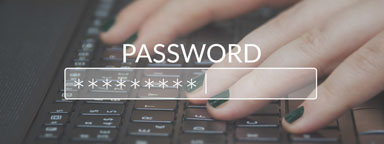
Hardware, not software-based password protection, is the best way to protect files and drives.

Secure important personal and private information on a PC with a hardware-encrypted SSD.

Breaches remain a major threat. Explore the need for comprehensive cybersecurity measures.

Here is a list of USB security features to consider for data protection.

Learn what the 3-2-1 data backup method is and why it is your best defence against ransomware.
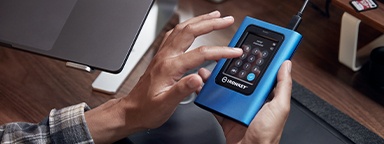
Learn data security best practices with Dr. Vynckier, and the importance of offline backups.

David Clarke covers encryption, super user safeguards, vulnerability management, and training.

Learn how Kingston IronKey's solutions helped EgoMind enhance their data security hygiene.

Built for disparate purposes, client SSDs and enterprise SSDs have different properties.

We discuss NIS2 and DORA, and how organisations can turn compliance into an opportunity.

We discuss the shifts in how organisations are storing and encrypting sensitive data.

Kingston examines how to secure sensitive files with the increasing vulnerability of email.

Learn how Kingston IronKey hardware-encrypted solutions supports NIS2 Directive compliance.

Kingston IronKey has hardware options to protect small and medium businesses against cybercrime.

FIPS 140-3 Level 3 is certified by the world-leading agency NIST as the apex of encryption.

Questions to ask when seeking the right SSD for your organisation’s data center.

Our infographic showcases the differences between software and hardware-based encryption.

2023 has been a year full of challenges and innovations. But what will 2024 bring?
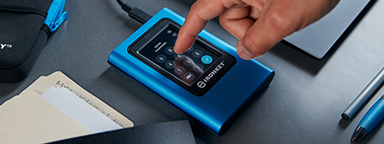
Learn about two methods that give SMBs superior resilience vs ransomware: encryption and backups.

In this whitepaper, we explain how to enforce a DLP strategy, while allowing USB drive use.
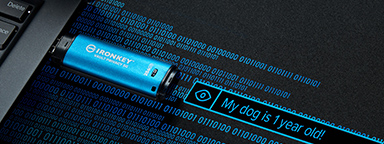
Enterprise-grade and military-grade digital security: two high standards with different requirements.
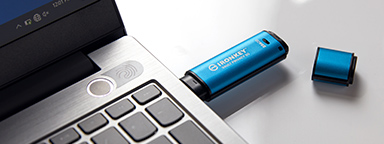
Learn how hardware encryption can protect a travelling lawyer’s confidentiality with secure file storage.

How is pen testing ensuring Kingston IronKey USB drives lead the way in trusted data security?

Hardware encrypted Kingston IronKey drives protects organisations’ data on the move.

Bring your own device (BYOD) policy is tricky for employers. How to balance security & convenience?

How do encrypted drives improve cybersecurity and compliance for finance companies? Kingston explains.

DLP offers tools for network admins to protect sensitive data from cybercrime and negligence.

A look at how the requirement for data encryption can be key to any organisation's security strategy.

How can we bolster network security with remote working and international travel so common now?

Invest in encrypted drives so you do not incur expensive legal fees if they are lost or stolen.

Discover why national security agencies trust Kingston IronKey to protect their data.

A company’s IT specialists should be expected to add data security to the PCs of remote workers.

Kingston’s three key practices for robust DLP for businesses that handle sensitive data.

You can read and write to an encrypted USB flash drive with an iPad or iPhone with the right adaptor. Here’s how.

Learn why hardware encryption beats software encryption for law firm data protection.

A brief explaining the purpose and types of data security software available.

Passphrases are superior to complex passwords for keeping data secure, with many powerful benefits.

HIPAA requires healthcare organisations to keep patient data safe at all times, including in transit.
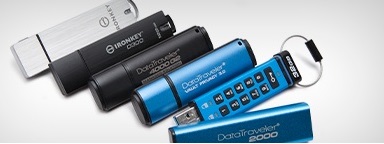
This requires encryption of sensitive data, appointing a Security Officer, cyber security programmes and policy adoption.

Kingston IronKey encrypted USBs are a security consideration for organisations of all sizes.

We compare unencrypted and encrypted USB drives and explain how to keep data secure!

Learn how Kingston IronKey is protecting the intellectual property with customisation.

Discover why Kingston IronKey is the go-to solution for protecting financial services data.

Learn how Kingston IronKey is securing the military operations’ data.
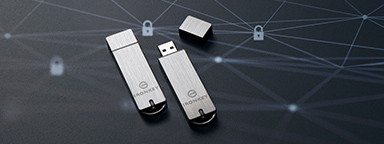
How can you get your organisation to use encrypted drives and make them part of your security policy? Here are some tips.

Learn how Kingston IronKey is protecting telecoms industry's data using encryption.

Encryption is an incredibly helpful option for creatives to protect their clients’ important files.

Kingston IronKey encrypted USBs: a small but important part of any organisation’s security strategy.

Kingston IronKey can help mitigate data loss due to the rise in lost electronic devices.

In this eBook, we explore how Encrypted USB drives have become a key tool in keeping data secure.
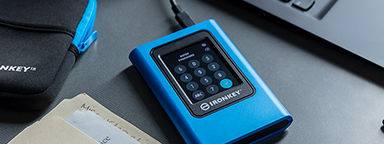
How to use your IronKey Vault Privacy 80 External SSD: set password, connecting to a PC and more.

Organisations are considering data security options to protect against private mobile data breaches.

Discover how Kingston IronKey is protecting the sensitive data of the finance sector.

Here is how Kingston IronKey helped protect the sensitive data of the Energy industry.

We explore our KingstonCognate experts’ thoughts on cyberthreats and cybersecurity challenges.

Protecting data on the move with superior hardware-based Advanced Encryption Standard (AES) 256.

Users can disable software-based encryption, which can lead to legal fees if the drive is lost.

We explore Tomasz Surdyk's thoughts on how all entities can stay secure in the digitised world.

Don’t plug any USB drives into your computer if you don’t know exactly where they came from.

What we learned from Kingston’s experts and tech influencers on work-from-home enablement Twitter chat.

There are benefits to using both cloud storage and hardware-based encryption.

We’ve examined several factors using unique research to identify what may impact markets globally in 2022.

2021 has been a year full of challenges and innovations. But what will 2022 bring?

Prof Sally Eaves shares her thoughts on the SME cybersecurity landscape and the need for education & support.

Bill Mew shares his thoughts how the largest security challenges need commitment from the boardroom.

Rob May shares his thoughts on how close we are to edge computing and the security it requires.

The pandemic has increased internet traffic, which has placed importance on the role of data centers.

The use of DLP software, VPNs, Encrypted SSDs and USBs, will help mitigate some risks of remote working.
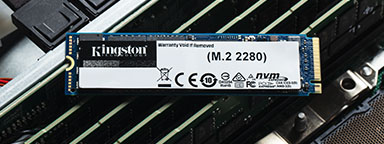
Cameron Crandall of Kingston helps you decide if you should move to your server storage to NVMe SSDs.

There are many advantages to using a dedicated hardware encryption processor in USB flash drives.

What will 2021 bring in Tech and trends? What do our KingstonCognate members and industry experts predicting for the future?

Cyber security and data privacy are everyone’s responsibility. What are the key considerations?

Learn why the future of business depends on SSD-enabled SDS, and how SSD fits into a Software Defined Storage Solutions.

Kingston & Matrix42 partnered to give optimal endpoint security solution in multiple sectors to mitigate risks.

The importance of organisations to consider Revenue, Profit & Risk as equal in organisations to ensure they mitigate data security & cyber security risks. Read this article from Industry Expert, Bill Mew & he will provide you with an insight on this topic.
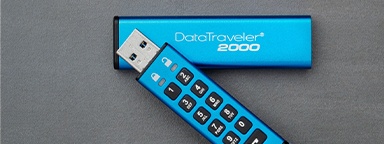
What do industry experts think has changed since the introduction of GDPR?
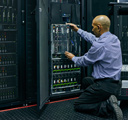
Data centres should be using server SSDs. There are many benefits over client drives and costs have come down.

NVMe is now the standard protocol for SSDs to empower data centres and enterprise environments.

Cloud and on-premise data centre managers can learn a lot from supercomputing.
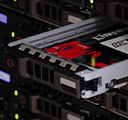
Find out how Hardwareluxx were able to manage the growth of their web traffic using Kingston's DC500M SSD.

SDS hasn’t lived up to its hype but now that NVMe is more affordable, the commodity hardware is ready to deliver.

Choosing the right SSD for your server is important since server SSDs are optimized to perform at a predictable latency level while client (desktop/laptop) SSDs are not. These difference result in better uptime and less lag for critical apps and services.

To work from home you need a good workspace for your PC, the right conferencing gear, and a secure connection.
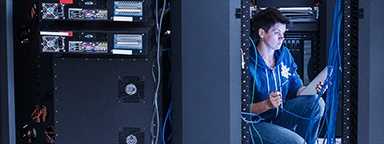
What strategies can organisations use to best secure customers data in a post-GDPR world with the ever-evolving nature of cyber security threats? Kingston pooled the knowledge of some of the UK’s most experienced commentators in cyber security to discuss how data protection has changed since the introduction of GDPR.
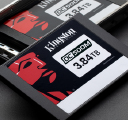
This whitepaper demonstrates how using Kingston Technology’s Data Centre DC500 SSDs can reduce your overall capital and licence costs by 39%.

You already know that remote working is a business enabler. But the challenges posed to your network security and compliance with GDPR are too big to ignore.

How to enable and disable Microsoft’s BitLocker eDrive feature to leverage hardware encryption on your Kingston SSD.

Some of Kingston and IronKey's Secure USB Flash drives are powered by partners, licensed technology, or services.
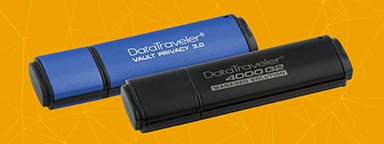
256-bit AES hardware-based XTS block cipher mode encryption is used in DT 4000G2 and DTVP 3.0.
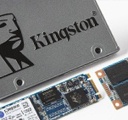
Firmware/hardware PFAIL protection is an highly effective method for preventing data loss in enterprise SSD.

Kingston datacenter SSDs provide excellent resiliency to protect sensitive data in OLTP workloads.

HPC can require massive amounts of data. SSDs consume a fraction of the power of their spinning disk.
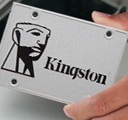
End-to-End Data Protection protects customer’s data as soon as it is transferred by the host system to the SSD, and then from the SSD to the host computer. All Kingston SSDs incorporate this protection.
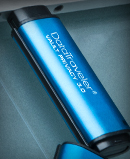
This program offers the options most frequently requested by customers, including serial numbering, dual password and custom logos. With a minimum order of 50 pieces, the programme delivers precisely what your organisation needs.

Everyday working life has changed radically and so have traditional ways of working: thanks to mobile storage media, we can access our data practically at any time from any location, and can work on our data wherever we are.
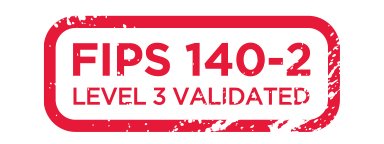
Most IronKey and Kingston secure USB flash drives are FIPS 140-2 Certified.

Heathrow Airport in London (30 October 2017) uses unencrypted USB drives for its non-cloud storage. Unfortunately, it was not standardized on encrypted USB drives.

Storage can be the most challenging component for VDI performance.

Testing is a cornerstone of our commitment to deliver the most reliable products on the market. We perform rigorous tests on all of our products during each stage of production. These tests ensure quality control throughout the entire manufacturing process.

